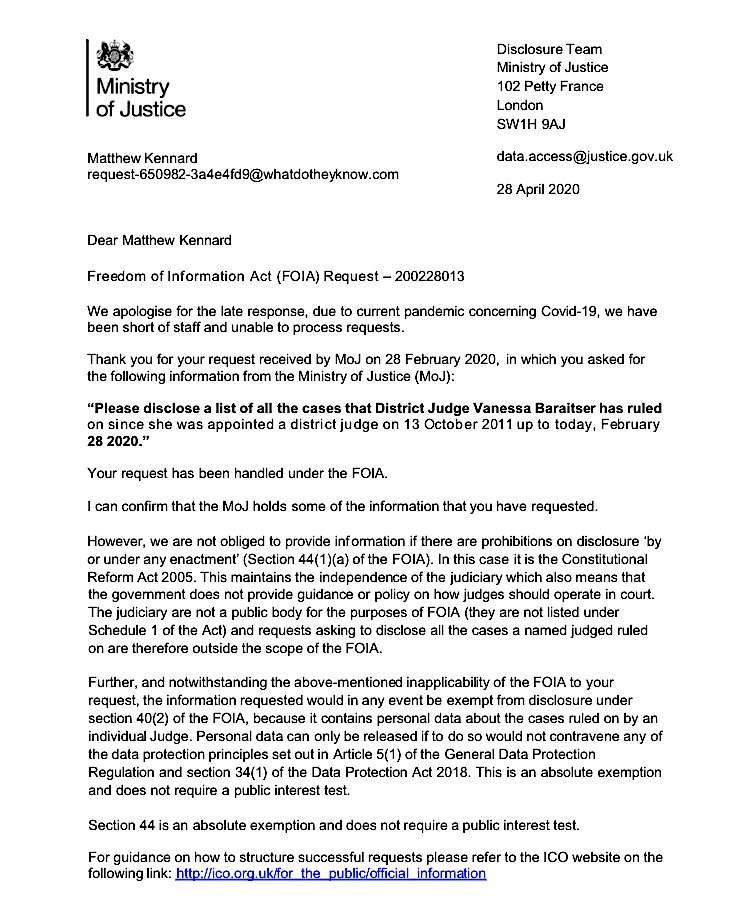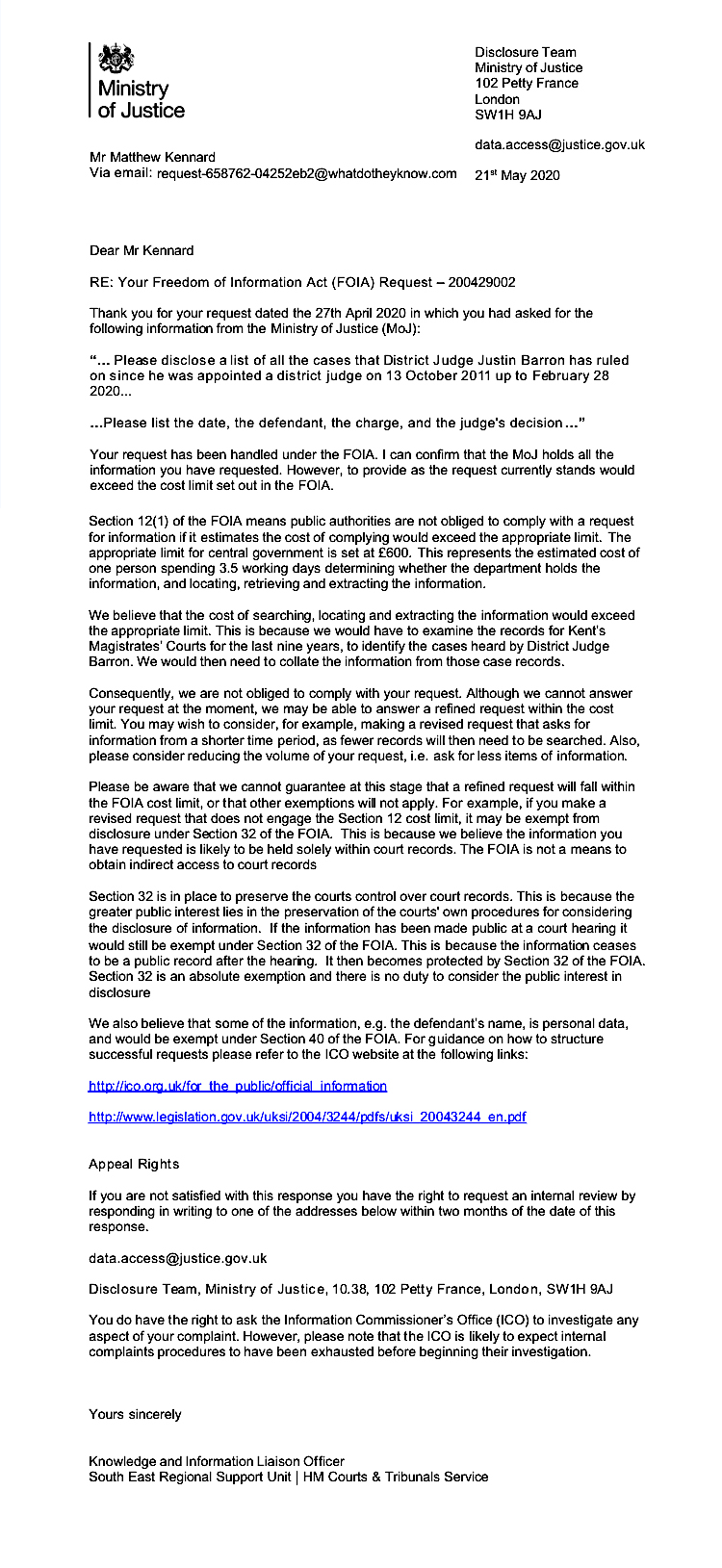Britain’s Ministry of Justice is blocking the release of basic information about the judge who is to rule on Julian Assange’s extradition, reports Declassified UK.
By Mark Curtis and Matt Kennard
Declassified UK
Declassified UK has discovered that Julian Assange’s judge, Vanessa Baraitser, has ordered extradition in 96 percent of the cases she has presided over for which information is publicly available.
Baraitser was appointed a district judge in October 2011 based at the Chief Magistrate’s Office in London, after being admitted as a solicitor in 1994. Next to no other information is available about her in the public domain.
Baraitser has been criticised for a number of her judgments so far concerning Assange, who has been incarcerated in a maximum security prison, HMP Belmarsh in London, since April 2019. These decisions include refusing Assange’s request for emergency bail during the Covid-19 pandemic and making him sit behind a glass screen during the hearing, rather than with his lawyers.
Declassified recently revealed that Assange is one of just two of the 797 inmates in Belmarsh being held for violating bail conditions. Over 20 percent of inmates are held for murder.
Declassified has also seen evidence that the UK Home Office is blocking the release of information about Home Secretary Priti Patel’s role in the Assange extradition case.

Request Denied
A request under the Freedom of Information Act (FOIA) was sent by Declassified to the Ministry of Justice (MOJ) on February 28, 2020 requesting a list of all the cases on which Baraitser has ruled since she was appointed in 2011. The MOJ noted in response that it was obliged to send a reply within 20 working days.
Two months later, on April 29, 2020, an information officer at the HM Courts and Tribunals Service responded that it could “confirm” that it held “some of the information that you have requested”.
But the request was rejected since the officer claimed it was not consistent with the Constitutional Reform Act. “The judiciary is not a public body for the purposes of FOIA… and requests asking to disclose all the cases a named judge ruled on are therefore outside the scope of the FOIA,” the officer stated.
The officer added that the “information requested would in any event be exempt from disclosure… because it contains personal data about the cases ruled on by an individual judge”, and that “personal data can only be released if to do so would not contravene any of the data protection principles” in the Data Protection Act.
A British barrister, who wished to remain anonymous, but who is not involved with the Assange case, told Declassified: “The resistance to disclosure here is curious. A court is a public authority for the purposes of the Human Rights Act and a judge is an officer of the court. It is therefore more than surprising that the first refusal argued that, for the purposes of the FOIA, there is no public body here subject to disclosure.”
The barrister added: “The alternative argument on data doesn’t stack up. A court acts in public. There is no default anonymity of the names of cases, unless children are involved or other certain limited circumstances, nor the judges who rule on them. Justice has to be seen to be done.”
Despite the HM Courts and Tribunals Service invoking a data protection clause, Declassified was able to view a host of cases with full names and details in Westlaw, a paid-for legal database. The press has also reported on a number of extradition cases involving Baraitser.
An internal review into the rejection of Declassified’s freedom of information (FOI) request upheld the rejection.
Identical Request
On April 10, 2020 Declassified sent an identical information request to the MOJ asking for a case list for a different district judge, Justin Barron, who was appointed on the same day as Baraitser in October 2011.
This request was answered by the MOJ swiftly, within 17 days, compared to two months with Baraitser. The information officer also noted that it “holds all the information you have requested” rather than “some” in the case of Baraitser. It is unclear why the HM Courts and Tribunals Service would hold only partial information on Baraitser, but not on Barron.
On this occasion, the request was not blocked. Instead, the information officer asked for further clarification about the information being sought, suggesting issues such as final hearing dates, the defendants’ names and what the defendants were charged with.
Declassified clarified that it wanted the list to include “the date, the defendant, the charge and the judge’s decision”.
The officer eventually declined the request, stating that it “would exceed the cost limit set out in the FOIA”, but adding: “Although we cannot answer your request at the moment, we may be able to answer a refined request within the cost limit.”
With Baraitser’s identical records, the possibility of refining the search was never offered – two “absolute” exemptions being applied to the request from the start.
Baraitser’s Record
Despite the rejection by the MOJ, Declassified has found 24 extradition cases that Baraitser ruled on from November 2015 to May 2019, discovered using the media archive Factiva and Westlaw. Of these 24 cases, Baraitser ordered the extradition of 23 of the defendants, a 96 percent extradition record from publicly available evidence.
Baraitser has ordered the extradition of defendants to at least 11 countries in this period, including one person to the UK. Six of the extraditions, or 26 percent of the rulings, were successfully appealed.


